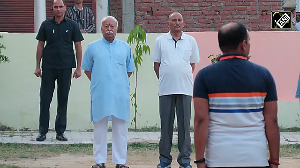With one week to go for the first round in the Uttar Pradesh assembly election, Faisal Kidwai asks pundits to analyse the straws in the wind.
Priyanka Gandhi hit the campaign trail last month to boost the Congress party's political fortunes in Uttar Pradesh.
Mayawati dumped more than half of her sitting legislators, including some ministers, to portray a 'clean' image.
Akhilesh Yadav is turning out to be the star campaigner for his father, Samajwadi Party supremo Mulayam Singh Yadav.
Then there is talk of Atal Bihari Vajpayee playing some sort of role in revitalising the Bharatiya Janata Party, albeit from party election posters.
As the most populous state in the country gears up for a crucial asembly election starting a week from now -- the first round is scheduled for February 8 -- no political party wants to leave any stone unturned in its campaign.
"I think it will be a hung assembly in which the BSP (the Bahujan Samaj Party, headed by current Chief Minister Mayawati} will emerge as the single-largest party," feels Rekha Saxena, associate professor, department of political science, University of Delhi, "followed by the Samajwadi Party."
"There will be a tie for the third position between the Congress and BJP," Saxena says. "There is also a possibility of an SP-Congress coalition. A BSP-BJP coalition also cannot be ruled out as they have shared power in the past."
Although Rahul Gandhi has been campaigning in UP for months now and the Congress has joined hands with Ajit Singh's Rashtriya Lok Dal, political observers believe the party is not expected to do well because it lacks grassroots infrastructure and the support of the Muslims and backward castes.
These observers feel Priyanka's entry will only have a marginal impact on the outcome.
Neera Chandhoke, professor, department of political science, University of Delhi, says: "Although Rahul's energy and commitment are to be acknowledged, there is no alternative to good party organisation at the grassroots, and this the Congress lacks. If they set their organisational house in order, combined with an enlightened leadership, the Congress will go far in many states."
While the Congress is hampered by a lack of organisation at the grassroots, Mayawati battles the anti-incumbency factor and a raft of corruption charges levelled against her personally and her party, the BSP.
She is projected to lose seats, but with the Dalit vote more or less in her bag, she is expected to put up a strong performance, especially if she is able to bring Brahmins, Rajputs and Muslims to her side, as she did in the 2007 assembly election.
Mulayam Singh Yadav, whose previous chief ministership is remembered more for the rise in criminal activities than governance, is set to gain the most from the anti-incumbency factor.
Observers say Yadav faces three major challenges: Mayawati's formidable war chest; his past record; and the shifting Muslim and backward caste votes.
If Yadav can overcome these factors then he can emerge as a strong contender, the observers say.
BJP leaders, observers say, have failed to exploit the corruption charges circling over Mayawati.
The BJP should have concentrated on Mayawati, these observers feel, instead of Rahul Gandhi and the Congress, which has never been a real contender for power anyway.
The BJP is expected to be in the third or four position, but if the BSP fails to secure a majority on its own, then the BJP could well play kingmaker and join Mayawati in forming a coalition government.
Please check Rediff Realtime News for the latest on the Uttar Pradesh election.










 © 2025
© 2025